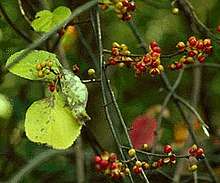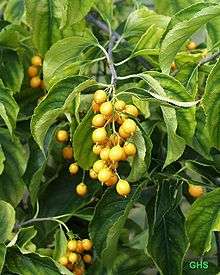Celastrus
Celastrus, commonly known as staff vine, staff tree or bittersweet, is a genus in the family Celastraceae which comprises about 30-40 species of shrubs and vines. They have a wide distribution in East Asia, Australasia, Africa, and the Americas.

Celastrus orbiculatus
| Staff vine | |
|---|---|
 | |
| Celastrus scandens | |
| Scientific classification | |
| Kingdom: | Plantae |
| Clade: | Tracheophytes |
| Clade: | Angiosperms |
| Clade: | Eudicots |
| Clade: | Rosids |
| Order: | Celastrales |
| Family: | Celastraceae |
| Genus: | Celastrus L.[1] |
| Species | |
|
See text | |
The leaves are alternate and simple, ovoid, and typically 5–20 cm (2.0–7.9 in) long. The flowers are small, white, pink or greenish, and borne in long panicles; the fruit is a three-valved berry.
In North America, they are known as bittersweet, presumably a result of confusion with the unrelated bittersweet (Solanum dulcamara) by early colonists. C. orbiculatus is a serious invasive weed in much of eastern North America.
Selected species
- Celastrus angulatus Maxim. – Chinese staff vine
- Celastrus australis – Australian staff vine
- Celastrus dispermus – orange boxwood
- Celastrus flagellaris Rupr.
- Celastrus gemmatus Loes.
- Celastrus hindsii Benth.
- Celastrus monospermus Roxb.
- Celastrus orbiculatus Thunb. – Oriental bittersweet
- Celastrus paniculatus Willd. - peng
- Celastrus pyracanthus – South African staff vine
- Celastrus rosthornianus Loes.
- Celastrus scandens L. – American bittersweet
- Celastrus stylosus Wall.
- Celastrus vaniotii (H.Lév.) Rehder[2]
gollark: Go install ṖöẗäẗÖṠ Ḧÿṗëṛċÿċḷë, andrew.
gollark: Both of which are bad.
gollark: "Communism" generally implies either central planning or magic let's-all-just-get-along-ism.
gollark: 𝓣𝓞𝓞 𝓑𝓐𝓓, 𝓘 𝓐𝓜 𝓝𝓞𝓣 𝓣𝓗𝓔𝓡𝓔.
gollark: 𝙲𝙾𝙼𝙿𝙰𝚂𝚂𝙴𝚂 𝙰𝚁𝙴 𝙽𝙾𝚃 𝚃𝙷𝙰𝚃 𝚂𝙷𝙰𝚁𝙿, 𝚃𝙷𝙾𝚄𝙶𝙷.
References
- "Celastrus L." Germplasm Resources Information Network. United States Department of Agriculture. 2007-10-05. Archived from the original on 2009-05-06. Retrieved 2009-04-16.
- "Species Records of Celastrus". Germplasm Resources Information Network. United States Department of Agriculture. Archived from the original on 2009-05-06. Retrieved 2009-04-16.
This article is issued from Wikipedia. The text is licensed under Creative Commons - Attribution - Sharealike. Additional terms may apply for the media files.